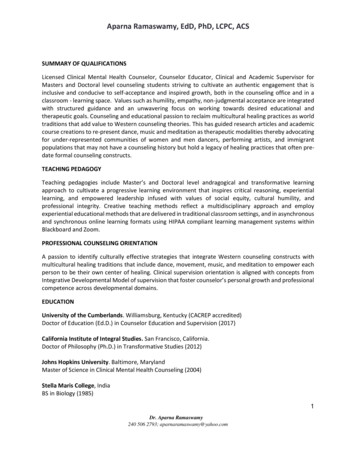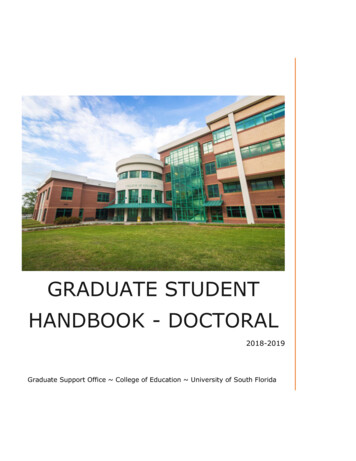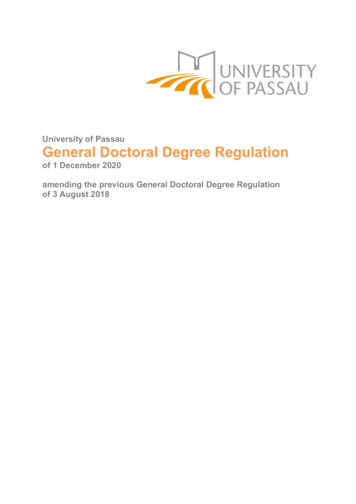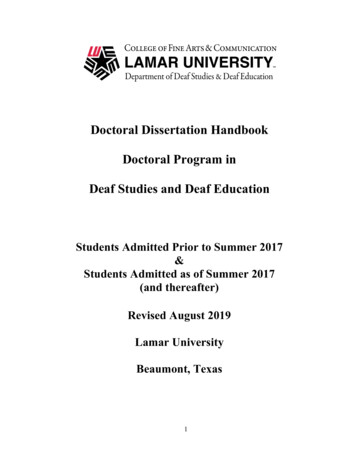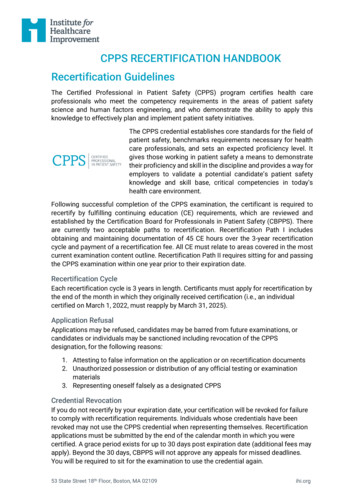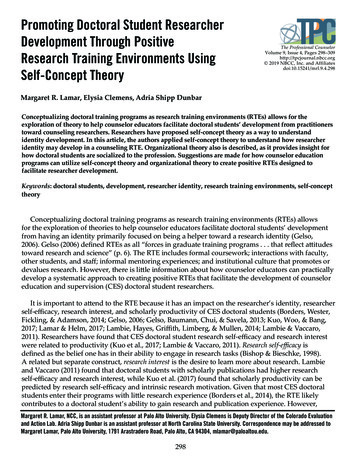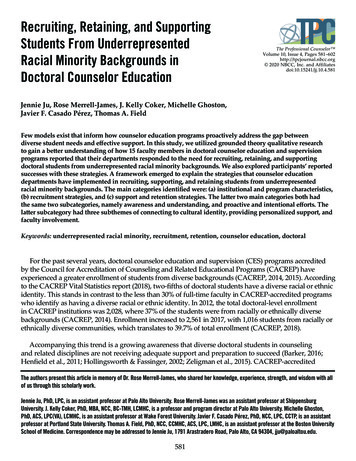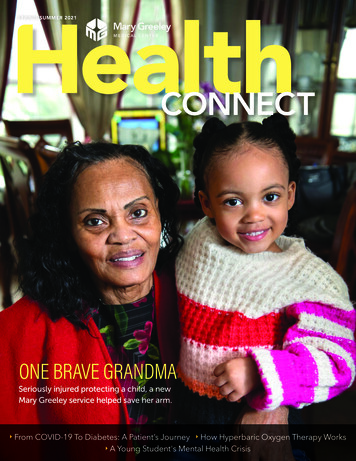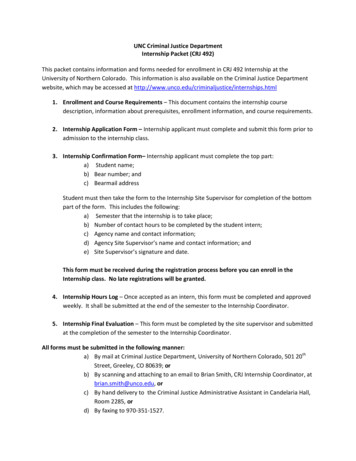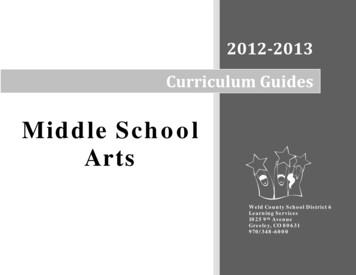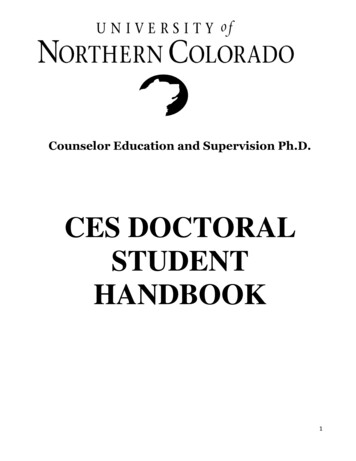
Transcription
Counselor Education and Supervision Ph.D.CES DOCTORALSTUDENTHANDBOOK1
REVISED February 2021USING THIS HANDBOOKWelcomeYourResponsibilityKeep RecordsContentsCongratulations!You are now part of a community of students, alumni, faculty, and staff witha fine reputation in the field of counselor education and supervision.You are responsible for following the policies and procedures in thishandbook, as well as those in the: UNC Catalog (http://catalog.unco.edu/) Graduate School’s Thesis, Capstone and Dissertation Resources tion-resources.aspx) and UNC CES Internship Manual nt-students.aspx ) Doctoral Program Professional Development Plans APCE Student Review and Retention HandbookMaintain complete records concerning all parts of your degree program.All parts of this handbook are important for compliance with programexpectations and success as a CES student. Review them now and oftenthroughout your program.General information is presented first, followed by sections separated byprogressive semesters and years in the program. Additional requirements andresources are also included. Necessary forms are provided in the appendices.2
Table of ContentsContentsUSING THIS HANDBOOK2Welcome . 2Your Responsibility . 2Keep Records . 2Contents. 2Contents. 3UNC COUNSELOR EDUCATION AND SUPERVISION PROGRAM5Contact Info . 5Faculty . 5Mission Statement . 5Professional Preparation . 6Standards and Accreditation . 6Program Objectives6Professional Counseling Orientation, Ethical Practice and Helping Relationships. 6Supervision. 6Teaching and Program Evaluation . 7Research and Scholarship . 7Social Cultural Diversity, Leadership, and Advocacy . 7Experiential Learning . 7Personal Growth and Understanding . 7Admissions and Matriculation 7Admissions Criteria . 7Application Process . 8Matriculation . 8Academic and Professional Conduct9Ethical and Legal Behavior . 9Grievance Procedures . 9Research Conduct . 9Other Policies . 9STUDENT EVALUATION 10Ongoing Evaluation . 10Professional Membership . 11Scholarly Contribution . 11STUDENT EVALUATION 11Student Evaluation. 11Student Evaluation Process . 11THINGS TO KNOW: FIRST YEAR 12Advisor . 12Counseling Services . 13Graduate Student Resource Room . 13Registration. 13Permission Courses . 133
Transfer Credits . 14Doctoral Minors. 14Residency Requirement . 15THINGS TO KNOW: SECOND & THIRD YEAR (& BEYOND) 16Advisor(s) . 16Supervision of Practicum . 16Written Comprehensive Exams . 17Oral Comprehensive Exams . 18Admission to Candidacy . 18DISSERTATION & GRADUATION 18The Dissertation Process. 18Qualitative Dissertations . 19Doctoral Committee . 19Dissertation Proposal . 20Dissertation . 21Graduation . 21Student Review and Retention Policy and Procedures Faculty and Student Manual 23STUDENT REVIEW AND RETENTION . 24Policy Document . 24STUDENT REVIEW AND RETENTION PROCEDURES . 28APPENDIX: FORMS36List of forms . 36CES Advising Sheet 494
UNC COUNSELOR EDUCATION AND SUPERVISION PROGRAMContact InfoFacultyCounselor Education and SupervisionCampus Box 131; McKee Hall 248University of Northern ColoradoGreeley, CO 80639Dr. Heather HelmChair, Department of Applied Psychology and Counselor EducationProfessorheather.helm@unco.edu(970) 351-1630Dr. Jennifer Murdock BishopCoordinator, CES Doctoral ProgramAssociate Professorjennifer.murdockbish@unco.edu(970) 351-2544MissionStatementIt is the mission of the Counselor Education and Supervision doctoral programfaculty to prepare individuals for the wide-ranging roles and responsibilities ofcounselor educators and supervisors. The program faculty strive to preparestudents to respond to the diverse needs of society through a social justiceperspective. Program faculty endeavor to provide for a depth and breadth oflearning across all areas of counselor education, including counseling,supervision, scholarship, teaching, leadership, and advocacy. The programfaculty aim to create an engaging and challenging learning environment whilemeeting individual students’ professional goals and aspirations. By fosteringself-discovery and awareness, the program faculty strive to honor students’unique contributions to the learning community while enrichingstudent/faculty mentoring and collegial relationships through appliedpedagogy, professional practice opportunities, and scholarly dialogue.5
ProfessionalPreparationThe UNC CES program prepares an individual for employment as acounselor educator and supervisor for colleges and universities.Training is offered in school counseling, clinical mental health counseling,couples and family counseling/therapy, counseling with children andadolescents.Graduates are also qualified for licensure as professional counselors, andmay be employed in such sites as community agencies, schools, counselingcenters, employee assistance programs, and private practice.Standards and Program requirements follow standards of:Accreditation the Counseling Profession Colorado Department of Higher Education and Colorado Deparementof Educationthe UNC Graduate SchoolCareer RequirementsThe University of Northern Colorado is accredited by the Higher LearningCommission of the North Central Association.Program lPractice andHelpingRelationshipsSupervisionDemonstrate a scholarly understanding and integration of counselingtheories and evidence based counseling practices (individual, couples,families, and groups) relevant to the treatment of clients in multiple settingsfrom an ethical, legal and culturally relevant perspective.Develop and further demonstrate knowledge of the ethical application ofassessment and testing and the interpreting of the results while consideringhistorical perspectives of assessment and testing. Demonstrate theprocedures for assessing clients using culturally relevant strategies in highrisk situations, identifying trauma and abuse, and using strategies fordiagnostic or intervention decisions. the integrity and value of our academicclimate.Gain significant understanding regarding the purposes of clinicalsupervision, the supervisory relationship, theoretical frameworks andmodels of clinical supervision, culturally relevant strategies and skills inclinical supervision, the use of technology in providing supervision.Develop an understanding of assessment strategies of supervisees,administrative procedures, legal and ethical responsibilities, and evaluation,remediation, and gatekeeping of supervisees.6
Teaching andProgramEvaluationGain knowledge and skills in pedagogy and teaching methods, models ofadult learning, instructional and curriculum design across modalities (e.g.,online, traditional, intensive short course), delivery, evaluation, andassessment methods, and ethical and culturally relevant strategies used incounselor education.Demonstrate an understanding of the roles of a counselor educatorsurrounding teaching such as the role of career development, human growthand development, mentoring and the responsibilities of screening,remediation, and gatekeeping of counselors in training.Research andScholarshipSocial CulturalDiversity,Leadership,and AdvocacyGain knowledge and skills in qualitative and qualitative research questionsappropriate for professional research and publication, humansubjects/institutional review board processes including ethical and culturallyrelevant strategies for conducting research, emergent research practices andprocesses, instrument design, and program evaluation.Demonstrate an understanding of professional conference proposalpreparation and presentations, professional writing for professionalpublication, and grant proposals and funding.Develop both theoretical and experiential understandings of theories andskills in leadership, strategies of leadership in consultation, leadershipdevelopment, administration and management in counselor educationprograms, higher education institutions, and professional organizations, andknowledge of accreditation standards and processes.Demonstrate an understanding of current issues in counseling and how thoseimpact counselors, clients, and their communities.Demonstrate an understanding of the counselor and counselor educators’roles and strategies for responding to crisis and disasters locally to globally.ExperientialLearningDevelop and demonstrate an integration of the knowledge and skills neededto be successful as Counselor Educators.PersonalGrowth andUnderstandingUtilize self-reflection to demonstrate an increased self-awareness andintegration feedback in a productive and thoughtful manner.Admissions and MatriculationAdmissionsCriteriaApplicants must possess a Master’s degree from a regionally accreditedcollege or university, or a comparable foreign institution. Additionally,7
applicants must have a grade point average (GPA) of at least 3.0 on a 4.0scale on the Master’s degree.ApplicationProcessNote: Applications must apply to the Graduate School at the University ofNorthern Colorado before the CES Program Faculty Members will reviewthe applicant’s request for admission. Applicants are also required to attendan interview.1. Complete the online application at: https://www.unco.edu/graduateschool/admissions/ and pay the application fee.2. Send official Transcripts: Applicants must request and send officialtranscripts. One official transcript from any accredited college or universitywhere a bachelor’s degree or higher was earned or is in progress (if you haveearned multiple degrees, bachelor’s level or higher, an official transcript isrequired from each college or university where a degree was conferred). Ifyou received a degree from UNC, you do not need to request a transcriptfrom UNC.3. Submission of Supplemental Materialso A Written statement must be completed regarding therelationship of the doctoral program to the future career goalsof the applicant.o Current Vita/Resumeo Supplementary Data Sheet Request three professional letters of recommendation Take the GRE: Official GRE scores (less than five years old) arerequired.Detailed admission information can be found culationOnce students are offered admissions into the program, they are sent a letteroutlining the following: Who their contact advisor will be Information about any Graduate Assistantship opportunities Which courses to take and how to register How to sign up for our Listserv, where they will receive importantinformation such as course syllabi Details about attending the mandatory New Student Orientation8
Academic and Professional ConductEthical andLegalBehaviorEthical and legal professional behavior is expected from students, as set forthby the American Counseling Association Code of Ethics: ACA Code ofEthics and the guidelines of UNC, the Graduate School, and the CESprogram.Unethical and/or illegal behavior may be cause for dismissal. See the StudentReview and Retention Policy in this handbook for detailed information.Honor Code: All members of the University of Northern Coloradocommunity are entrusted with the responsibility to uphold and promote fivefundamental values: Honesty, Trust, Respect, Fairness, and Responsibility.These core elements foster an atmosphere, inside and outside of theclassroom, which serves as a foundation and guides the UNC community’sacademic, professional, and personal growth. Endorsement of these coreelements by students, faculty, staff, administration, and trustees strengthensthe integrity and value of our academic climate.GrievanceProceduresResearchConductPlease refer to the Dean of Students websitehttp://www.unco.edu/dos/See the Review and Retention Policy as stated at the end of this handbook.Institutional Review Board approval is required for all research under theauspices of UNC, including dissertation research, in order to protect therights of subjects in the study.See the IRB website from the Office of Sponsored Programs for moreinformation: r PoliciesContinuous Enrollment: All doctoral students are required to registercontinuously from the time they first enroll in their graduate degree programuntil the semester or term in which they graduate. Doctoral students must beenrolled for at least 1 credit hour each academic semester (fall and spring) tobe in compliance with this policy. Doctoral students not in compliance withthe program continuation policy will automatically be assessed a 150continuation fee each semester (fall and spring) of non-registration.Doctoral students holding an academic-year graduate assistantship mustenroll in a minimum of 3 credit hours (fall and spring); those holding afiscal-year assistantship must enroll in a minimum of 3 credit hours (fall,spring and summer) to be in compliance with the terms of their assistantshipagreements and this policy. Graduate assistants are not eligible for the 150continuation fee.All doctoral students must enroll in at least 1 credit hour during the semester(fall, spring or summer) they take scheduled examinations (i.e., oral9
comprehensive examination or dissertation/capstone defense-must monitorynot taking more credits than required) and/or intend to graduate. Doctoralstudents engaged in the above referenced activities but who have not enrolledin at least 1 credit will automatically be assessed the 150 continuation feefor that semester, will not have the results of their examinations recorded,and will not be allowed to graduate.Transfer of credit from other institutions will not be considered in lieu ofcontinuous registration.Failure to Continuously Register for Graduate Students. Students whofail to register continuously (i.e., enroll for at least 1 credit fall and springterms) for one calendar year (three consecutive semesters, fall, spring,summer) will receive a letter of warning from the Graduate School. At thebeginning of the fourth consecutive semester of non-enrollment the studentwill be classified as inactive. Inactive students must re-apply to the GraduateSchool within the fourth semester of non-enrollment, remit the applicationfee, and be re-accepted by their program and the Graduate Dean if they wishto resume their studies. Acceptance is not guaranteed. Additionalcoursework and examinations may be required for students who arereactivated.After four consecutive semesters of non-enrollment the student’s file isclosed and may not be reactivated. Students who wish to return after 4consecutive semesters of non-enrollment must file a new application forconsideration with the University; acceptance is not guaranteed. Note:paying the 150 continuation fee does not fulfill the requirement toenroll for at least 1 credit within the one year timeframe.Specific requirements exist for number of registered credit hours duringexaminations, dissertation, and graduation semesters.See Policies and Procedures under General Information in theUNC Graduate Catalog or UNC Graduate Student Handbook for detailedinformation.STUDENT EVALUATIONOngoingEvaluationStudents are continuously evaluated on academic performance, clinicalperformance, ethical and legal behavior, professional demeanor, andinterpersonal skills. The CES faculty discusses evaluations and programprogress and feedback is provided to the student by the student’s advisor.Please see Student Evaluation and Professional Development PlansHandbook for further directions on this process.You are responsible for participating in your evaluation as described in thishandbook. The CES Internship Manual also outlines evaluations related tointernships and these evaluations are a portion of your semester n/current-students.aspx10
ProfessionalMembershipCES students are required to maintain membership in the: American Counseling Association (ACA) –http://www.counseling.org/ and Association for Counselor Education and Supervision (ACES) http://www.acesonline.net/.The faculty also highly recommend membership in: the Colorado division of ACA (CCA) –http://www.coloradocounselingassociation.org. and Rocky Mountain ACES – http://www.rmaces.com.See the organizations’ websites to apply for and renew membership.ScholarlyContributionCES students are required to submit a proposal to present at a local, regional,national, or international conference prior to graduation.A copy of proposals submitted should be turned into the student’s advisor. Acopy will be kept in the student’s academic file. If accepted, students mustfile a copy of the presentation handouts with their advisor.It is highly recommended that students submit at least one grant proposalduring their program. If this occurs, students must submit a copy to theiradvisor who will include it in the academic file. If accepted, students shouldalso file a copy of the notification.STUDENT sEach fall a Professional Development Plan must be completed, which includesanswering personal and professional development questions for assessingyour own development and sharing various materials with the faculty.Responses to the questions will be used by faculty as part of your reviewprocess. For further information please see the Student Evaluation andProfessional Development Plan Handbook.The faculty will complete an evaluation of each CES student twice a year;once in the Fall and once in the Spring. During these student reviewmeetings, the faculty utilizes various methods of assessment to allow for acomprehensive evaluation of each student, including academic grades,faculty feedback, course assignments and rubrics, and other variousprofessional development documents.To assist the faculty in their evaluation, the CES doctoral student is requiredto prepare various documents and summarize them in a ProfessionalDevelopment Plan. The documents that will be included in your reviewpacket change each semester (for example, First Year, Fall Semester).Examples of the documents that may be included in your packet are your11
CV, assignments that were completed during your courses, and questions thatassess your professional development. All of the documents that are includedin your Professional Development Plans are used to assess your progress inthe program and evaluate program objectives. The evaluation process willprovide an opportunity for the CES doctoral student to gather, organize, andprepare professional documentation of their academic growth.Since the documents that are required for the Professional DevelopmentPlans will change every semester, the CES Student Evaluation andProfessional Development Plans handbook includes an overview of theProfessional Development Plan for each semester of the program. The CESstudent should reference this handbook to determine what documents arerequired. The student evaluation process and professional development plansare due the last Friday of November in the Fall and the last Friday of April inthe Spring.Faculty completes their review of students during the first faculty meeting ofeach semester (fall and spring). Feedback to students is available by midSeptember (except for 1st year students) and mid-February, respectively.Schedule a 30-minute feedback meeting with your contact or research advisortwo to three weeks after submitting each semester’s professional developmentplan.THINGS TO KNOW: FIRST YEARAdvisorThe Contact Advisor you were assigned upon acceptance will advise you inthe design of your program of study. Please contact your Contact Advisorduring the first semester. Faculty are not on contract over the summer and soemail contact may be sporadic, and in-person meetings may be difficult. Ifyou email or phone your Contact Advisor during the summer they willrespond at their earliest convenience. Try to obtain all relevant informationand forms prior to the summer months. During the semester before you sitfor Comprehensive Exams, you will request a faculty member to serve asyour Program and Research Advisor (the Chair of your Dissertation). Listedbelow are the responsibilities of your Program and Research Advisor.Related to your program, your Program and Research Advisor will: send forms for appointment as your advisor advise you on remaining course selection prepare the course of study approve transfer credit communicate review results to you help you design your internship plan approve written and oral comprehensive exam requestsRelated to your research, your Program and Research Advisor will: serve as your Doctoral Committee Chair guide you during your selection of a dissertation topic12
CounselingServicesGraduateStudentResourceRoomguide you on selection of and approval of other members of yourdoctoral committeeguide you during your preparation of the research proposalguide you during the preparation of your dissertation, andchair your oral exam, dissertation proposal, and dissertation defensecommitteesCounseling Services are available on the University of Northern Coloradocampus in the Counseling Center. These services are not connected to thePsychological Services Clinic where your training will occur and you canobtain counseling services at that location without cost and without thefaculty member or program’s knowledge. Further information can beobtained at http://www.unco.edu/counseling/.The Graduate Student Resource Room is located directly across the hall fromthe APCE office. Each doctoral student has an individual mailbox located inthe Graduate Student Resource Room. Please be sure to check your mailboxon a regular basis for important information or documents from Faculty orStaff. This room is also available for study and social gatherings.Frequently, announcements are posted in the resource room and sign-ups arealso conducted in this area. Also, a refrigerator, microwave, computer andprinter are available for your use. Students are responsible for keeping theresource room clean and attractive.RegistrationYou will register online on the URSA system using your Bear number.Follow the procedures on the URSA website: ursa.unco.eduPermissionCoursesSome CES and other courses you will take are restricted by number orprerequisites. Follow the instructions below to request a release to register.If the class is labeled “permission ofinstructor”is labeled “permission ofthe practicumcoordinator”is an SRM (statistics)classhas a full permission list.you should Contact the instructor to request a release. Look for APCE listserv announcementsabout sign-up week (in October for thefollowing spring, in February for thefollowing summer and fall). Sign up on the sheet in the hallwayoutside the APCE main office.Contact the SRM office administrativepersonnel to request a release (website).Request to be added to the alternatepermission list. You will be contacted at a13
later date if you can register for thecourse.If you
Coordinator, CES Doctoral Program Associate Professor jennifer.murdockbish@unco.edu (970) 351-2544 Mission Statement It is the mission of the Counselor Education and Supervision doctoral program faculty to prepare individuals for the wide-ranging roles and responsibilities of counselor educators and supervisors.
